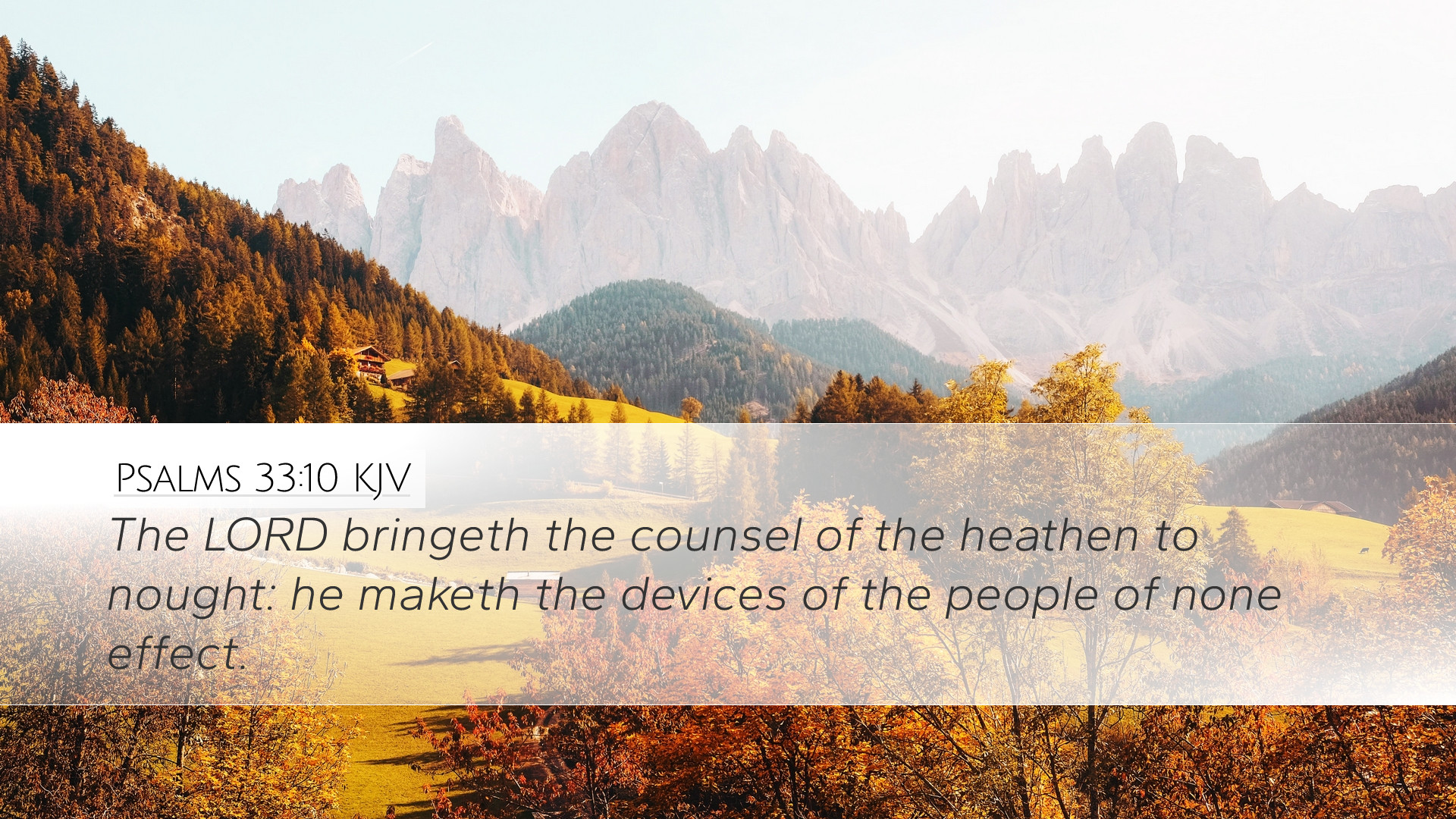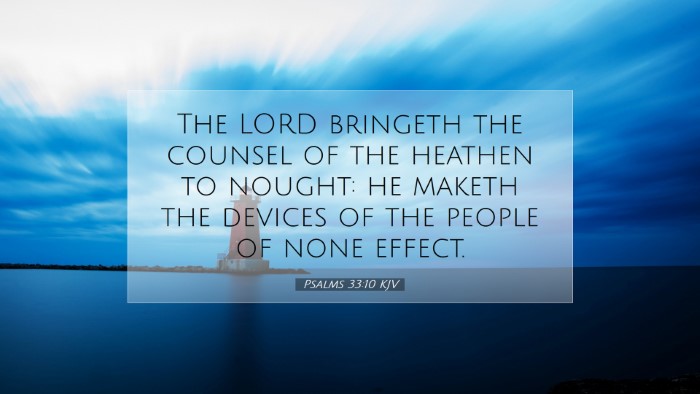Commentary on Psalms 33:10
Bible Verse: Psalms 33:10 - "The LORD brings the counsel of the nations to nothing; he frustrates the plans of the peoples."
Introduction
The verse Psalm 33:10 encapsulates a profound theological truth about God's sovereignty over human affairs and His supreme authority over the plans and counsels of nations. Commentaries from esteemed theologians and biblical scholars shed significant light on the implications of this verse for understanding the overarching narrative of divine providence within the Scriptures.
The Sovereignty of God
This verse begins with a declaration of God’s sovereignty: "The LORD brings the counsel of the nations to nothing". Matthew Henry emphasizes that this statement establishes that all human counsel is subject to the ultimate power of God. Nations may devise plans, yet their effectiveness does not stand without God’s agreement and oversight.
Albert Barnes echoes this sentiment with a reminder that God’s authority is absolute; He nullifies the intentions of the proud, reminding believers that they are under His divine will. Adam Clarke provides further insight by noting the temporal nature of worldly plans compared to the eternal nature of God's purposes; what God allows to stand is eternal, whereas human plans can be fleeting and ultimately futile.
The Futility of Human Plans
The second part of the verse emphasizes that God "frustrates the plans of the peoples." This aspect highlights a core theme throughout the Scriptures: that human attempts at self-governance can be thwarted by God’s omnipotent will. Henry notes that nations may plan and strategize, yet without God's blessing, such plans can result in confusion and failure.
Barnes further illustrates this point through historical examples in Scripture, where plans made by kings or nations fell short against God's will—as seen in the cases of Pharaoh, Nebuchadnezzar, and Herod. Clarke points out that individual human arrogance often leads to unwarranted confidence in worldly wisdom, contrasted sharply with the wisdom of God which directs the affairs of humanity.
Theological Implications
This verse invites reflection on the nature of God’s providential care for His people amidst the chaos of worldly conflicts. Henry explains that such divine oversight should instill confidence and reliance among believers, knowing that God's counsel will always prevail. The psalm serves as a reassurance amid uncertainty, pointing to God's faithful character as a foundation for hope.
Barnes encourages readers to trust in the Lord’s guidance and not in their own understanding, aligning with Proverbs 3:5-6. The acknowledgment that God can render human schemes fruitless helps believers cultivate patience, understanding that God’s timing and plans differ from human expectations.
Clarke articulates a profound connection between divine sovereignty and human responsibility, suggesting that while God’s purposes are ultimately realized, He still works through human action. Thus, believers are encouraged to align their decisions with divine principles, observing the balance of faith and responsibility.
Practical Applications
Understanding Psalm 33:10 equips pastors and leaders to guide their congregations in several practical ways:
- Encouragement in Prayer: Remind believers of the power of prayer. When faced with challenges, they should bring their concerns to God who controls the outcomes.
- Trust in God’s Plans: Encourage congregants to seek God's direction and trust in His ultimate plans regardless of current circumstances, as God's counsel will prevail.
- Humility in Leadership: Leaders should model humility, recognizing their plans are subject to God’s will, prompting a culture of dependence on divine wisdom within the church.
- Response to Worldly Power: Teach that while nations may wield power, God remains sovereign over all, fostering resilience and hope among believers during political or social upheaval.
Conclusion
Psalms 33:10 asserts the powerful truth of God's sovereignty over the plans of both nations and individuals, illuminating the futility of human schemes against His divine will. As believers reflect on this verse, they are reminded of the essential truth that God's wisdom and plans will ultimately prevail. In closing, we are called to submit our plans to God, seek His counsel, and take comfort in His unchanging nature amidst the ever-shifting landscape of human affairs.


